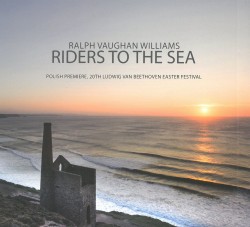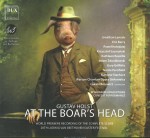 Vaughan Williams – Riders to the Sea; Holst – At the Boar’s Head
Vaughan Williams – Riders to the Sea; Holst – At the Boar’s Head
Soloists; Warsaw Chamber Opera Sinfonietta; Lukasz Borowicz
Dux DUX 1307-1308
This fine CD set is an innovative collaboration between Warsaw’s 2016 Easter Ludwig van Beethoven Festival and the Yale Opera Program directed by Doris Yarick-Cross. Riders to the Sea is convincing and gets even better towards the end. The libretto is an abridgement of the celebrated play (1903) by John Millington Synge who, staying in the Aran Islands off the west coast of Ireland, saw a body wash up on shore. Synge was well-versed in local speech and customs and knew the threat of tremendous storms to fishermen. Vaughan Williams’ chamber opera reflects the story’s pathos and resignation in melancholy, restless parallel chords underpinning the idiomatic rhythm and line of the singers’ dramatic recitative. Compared to the play though, folklore and overall Irishness are much reduced with no Celtic music or Irish accents; the music is early modernist with considerable dissonance. The orchestra is less than classical-sized, but directed by Łucasz Borowicz, the Warsaw Chamber Opera Sinfonietta strings are precise and full-bodied. Woodwinds provide evocative solos and added ocean-wave sounds are effective.
Maurya is the mother of five sons lost to the sea. The tragedy becomes unbearable when Kathleen Reveille sings eloquently of the sixth and last, “Bartley will be lost now,” in her rich, haunting mezzo-soprano backed by the wailing women’s chorus. Soprano Nicole Percifield and mezzo-soprano Evanna Chiew as her daughters, and baritone Gary Griffiths as doomed Bartley, emerge as distinct personalities with clear diction and emotional depth.
 Gustav Holst’s At the Boar’s Head (1924; the Boar’s Head is a pub) arose from the idea of fitting scenes from Shakespeare’s Henry IV involving the character Sir John Falstaff to English folk-song tunes. To appreciate this one-act comic opera, with material familiar to English audiences then but less so to us now, one must read the libretto beforehand and check out Elizabethan English vocabulary (sometimes bawdy or sexist). Fortunately, Shakespeare’s dialogue and rhetoric are outstanding and with coaching by Yarick-Cross, this cast’s projection and tone are impeccable. As the opera progresses events become more and more tangled as does the music, for example when Falstaff and Doll Tearsheet sing a ballad while young Prince Hal (the future Henry V) delivers an aria with the text of Shakespeare’s sonnet “Devouring time, blunt thou the lion’s paws.” Excitement mounts as Falstaff’s enemies start to appear; I won’t reveal the ending.
Gustav Holst’s At the Boar’s Head (1924; the Boar’s Head is a pub) arose from the idea of fitting scenes from Shakespeare’s Henry IV involving the character Sir John Falstaff to English folk-song tunes. To appreciate this one-act comic opera, with material familiar to English audiences then but less so to us now, one must read the libretto beforehand and check out Elizabethan English vocabulary (sometimes bawdy or sexist). Fortunately, Shakespeare’s dialogue and rhetoric are outstanding and with coaching by Yarick-Cross, this cast’s projection and tone are impeccable. As the opera progresses events become more and more tangled as does the music, for example when Falstaff and Doll Tearsheet sing a ballad while young Prince Hal (the future Henry V) delivers an aria with the text of Shakespeare’s sonnet “Devouring time, blunt thou the lion’s paws.” Excitement mounts as Falstaff’s enemies start to appear; I won’t reveal the ending.
Bass-baritone Jonathan Lemalu is spirited and sounds wonderful as Falstaff. Tenor Eric Barry is smooth and pure-voiced as Prince Hal, especially in the sonnets which also include When I do count the clock that tells the time. I would have liked to hear more of Hal’s nasty side in his singing. As in the Vaughan Williams, Nicole Percifield as Doll and Kathleen Reveille as the Hostess are convincing dramatically and musically. With roles for bass Pawel Kołodziej and three baritones the production becomes a feast of low male voices, recommended for those interested in Shakespeare and English song.



